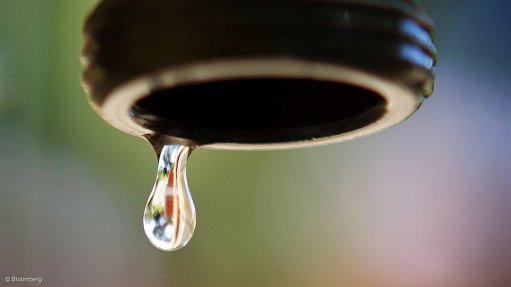
Photo by: Bloomberg
Community activists have called on the City of Cape Town Metropolitan Municipality to prioritise the improvement of access to water and proper sanitation services in local communities.
The City last week dedicated R4.3-billion in the next year to investing in water and sanitation infrastructure, with a total investment of R18.5-billion in the pipeline over the next three financial years.
At least R38-million will be used to provide basic services to informal settlements with new taps and toilets, while R1.8-billion will be channelled for the expansion and upgrade of wastewater treatment plants.
Experts and activists gave their views on the City's water plans, with some warning that it should particularly zoom in on improving water quality, water access and maintenance of infrastructure at wastewater treatment plants.
Water and Sanitation MMC Zahid Badroodien said the City wants to continue to deliver clean, reliable drinking water and dignified sanitation services to residents, as well as treat wastewater so that the metro can safeguard the environment and improve inland water quality.
"The budget will be used for the required new infrastructure as well as the upgrading and rehabilitation of existing infrastructure," he said.
According to the City, R157-million will be spent on generators and uninterruptible power supply installations for sewer and pump stations to build resilience during loadshedding.
Khayelitsha Development Forum chairperson Ndithini Tyhido said the forum welcomes the news of additional taps and toilets to be provided by the municipality.
He said that there was an ongoing shortage of toilets and sanitation services in Khayelitsha, with more than 70% of households not having proper access to water and sanitation services.
Tyhido said a lack of access to water and sanitation services was "dehumanising" for residents and "brings a sense of hopelessness" to those living in informal settlements.
"We are one of the most densely populated neighbourhoods and we have the highest amount of informal settlements. Most of these informal settlements are unplanned and cannot be developed, such as the settlements in wetlands and dunes," he said.
Bonteheuwel Development Forum chairperson Henriette Abrahams called for the improvement of water service delivery in the wider Cape Flats region.
There is an ongoing shortage of water on properties in Bonteheuwel as the number of backyard dwellers is increasing, Abrahams said, adding that as many as 55 people could be living on one plot.
"No provisions have been made for the number of people on one plot.
Water meters do not take this into account," she said, adding that infrastructure also needs to be replaced.
Abrahams, who also serves as chair of the Women's Assembly, said improving access to toilets and taps in informal settlements would improve the safety of women who use communal ablution facilities.
"Women have to go to toilets at night feeling unsafe and at risk of being abused [or harmed]," she said.
ActionSA's Western Cape chairperson Michelle Wasserman cast doubt on the implementation of the budget and described it as "insufficient".
She said the City should prioritise ensuring that "within three years, the sewage pumping into the ocean through marine outfall pipes is treated to a level that does not contain harmful chemicals, and that all communities living in [the metro] are provided with access to water and sanitation".
Professor Leslie Petri of the University of the Western Cape said the budget indicates a step in the right direction, adding that an increased focus on water, sanitation and purification was needed.
"We are in a situation of failed infrastructure in the City. All our wastewater treatment plants are overwhelmed and are not functioning adequately," said Petrik.
She added that the city was facing a "serious" sanitation problem, especially in unplanned settlements where proper water and sanitation services are not provided.
She said: "Proper servicing of these settlements should be our number one priority. In those settlements, one person just needs to get cholera for us to have a massive outbreak because there is sewage flowing in our streets."
Ageing water and sewage infrastructure also poses a significant risk to residents of the municipality.
"There is such a big backlog that putting all these measures in place will take a long time. We have suburbs where infrastructure is failing frequently as well as non-rate-paying areas that still need infrastructure," Petrik said.
Lead researcher at the University of Cape Town's Future Water Institute, Kevin Winter said the budget included significant interventions to improve water quality, infrastructure and new technologies.
"We have current challenges with poor water quality that partly arose from Day Zero, where attention and the 'crisis budget' was given over to supplying more water.
As a result, investments in treating water effectively were limited, resulting in poor quality that has caused significant deterioration of our waterways, lakes and beaches," said Winter.
He said the R38-million allocated for fixing taps and toilets in informal settlements was essential, but maintaining the fixtures located in public spaces would be a challenge.
"The big, ambitious goal is to invest in infrastructure that will ensure a tap, toilet and shower in every home to ensure proper sanitation for residents and reduce health risks and the impact of untreated water on the environment.
This is a huge challenge for municipalities and has significant consequences if sanitation and drainage are neglected," he added.
Winter also said that ageing infrastructure and technology were an ongoing problem, and the municipality urgently needs to implement new technologies to improve water quality.
Badroodien said the municipality would focus on upgrading and replacing infrastructure to ensure that residents have access to water. However, the management of infrastructure is a continuous process.